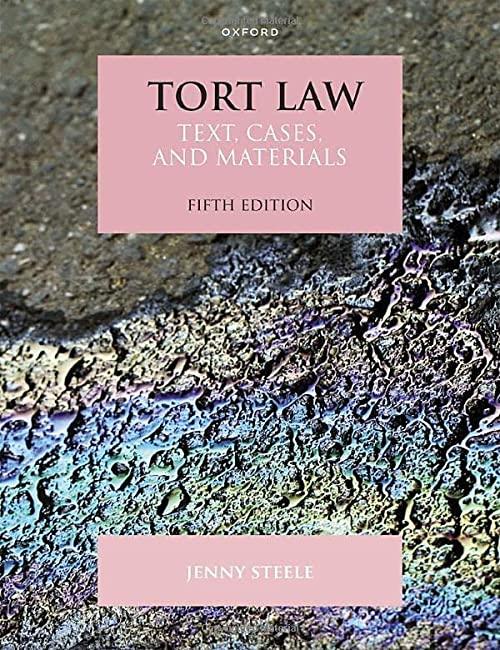Question
BM0204 Business Law Short written responses - Cases Case 1: Discharge of Contract (Novation) - Topic 5 Assume that John bought a car from Peter
BM0204 Business Law
Short written responses - Cases
Case 1: Discharge of Contract (Novation) - Topic 5
Assume that John bought a car from Peter for $15,000 on credit terms, which he plans to clear in the next twelve months. Even before John makes the first monthly installment, he gets a medical emergency and needs immediate cash to settle the bill. Therefore, John decides to sell the car to Mary under the same terms as Peter. John wants to exit the transaction but owes obligations to both Peter and Mary.
Therefore, John decides to settle his debt obligation through a novation by talking Peter and Mary into a novation agreement. The parties agree to enter into the agreement by signing the novation agreement, where Mary takes over John's obligations to Peter, and she will now be required to meet all the obligations that John owed Peter. The novation agreement may allow the repayment schedule to be renegotiated, on the condition that the parties agree on the new terms.
However, Mary could not complete making the payments to Peter. Now Peter is very frustrated that John has lured him into a silly deal with Mary. Peter is suing both Mary and John for some damages.
What would the Courts decision be on this case?
Case 2: Discharge of Contract (Quantum Meruit) -Topic 5
Codelfa entered into a contract with NSW State Rail Authority to excavate and underground railway channel within 130 weeks of signing of the contract. To achieve this result, both parties were aware that Codelfa would need to work 24 hours a day, seven days a week.
However, the noise and vibrations caused by the excavations, were so great that the local residents obtained an interim injunction restricting the amount of noise at night and reducing the working week to six days. This caused Codelfa additional costs and therefore loss of profit and is under stress.
Did the granting of the injunction frustrate the contract, entitling Coldelfa to recover on a quantum meruitrather than the originally agreed price?
What would be the decision on this case by the Court?
Case 3: Sales of Goods - Topic 6
The parties entered into a contract for the sale of Chinese Manufacturer
PVC resin referred to all in relevant documentations as PVC resin S1000. Prior to entering the contract, the purchaser was:
- informed that the risen was manufactured in China
- supplied with manufacturer's specification for the product and
- supplied with a sample of sufficient quantity for the purchaser to carry out tests as to suitability.
After having received deliveries of the resin, the purchaser refused to pay, claiming some of the resin had failed to satisfy the description of the product ordered.
If the goods supplied comply with the manufacturer's specifications and sample, is there a breach of the implied term for compliance with description.
What would be the Court's decision?
Case 4: Hire Purchase Agreement -Topic 7
An agreement dated 23rd December, 1892, was entered into
between " the owner " (the plaintiff), of the one part, and " the
hirer" (Mr. Brewster), of the other part, by which the owner
agreed to let a piano on hire to the hirer. The hirer agreed
to pay the owner " a rent or hire installment " at the date of the
agreement and on a given date of each succeeding month, to
keep the piano from injury, and not to remove it from his
custody without the owner's written consent, and if the hirer
failed to perform the agreement the owner might terminate the
hiring and retake possession. The owner agreed that the
hirer might terminate the agreement by delivering up the
piano to him, but if the hirer paid thirty-six instalments in the
manner specified the piano was to become " the sole and
absolute property of the hirer," but until the full sum mentioned
was paid the chattel was to " be and continue the sole
property of the owner."
On the 22nd of April, 1893, after only a few of the instalments
had been paid, Brewster improperly and without the consent of
the plaintiff pledged the piano with the defendants, who were
pawnbrokers, as security for an advance. The plaintiff, on
discovering this, demanded the piano from the defendants, and
on their refusing to deliver brought an action of trover.
Note: Trover is the name of the action which lay, at common law, for the recovery of damages for the conversion of personal property in his possession, usually involving chattels held in bailment.
What would be the Court's decision on this case? Do you think the owner of the Piano (Plaintiff) is entitled to some damages from the defendants?
Case 5: Employment Contract - Topic 8
Wong was employed by the Globe and Mail and, at the conclusion of the employment relationship, was paid a sum of money as part of a settlement that was reached by the parties. The terms of the settlement agreement included a confidentiality provision, prohibiting Wong from disclosing the settlement. Three years later, Wong published a memoir, in which she referred to the settlement and the fact that she received "a big pile of money to go away." The Globe and Mail sought to enforce the confidentiality provision to sue Wong for breaching the confidentiality provision.
Do you think Gobe and Mail are entitled to some damages from Wong? What would be the Court's decision.?
Step by Step Solution
There are 3 Steps involved in it
Step: 1

Get Instant Access to Expert-Tailored Solutions
See step-by-step solutions with expert insights and AI powered tools for academic success
Step: 2

Step: 3

Ace Your Homework with AI
Get the answers you need in no time with our AI-driven, step-by-step assistance
Get Started


